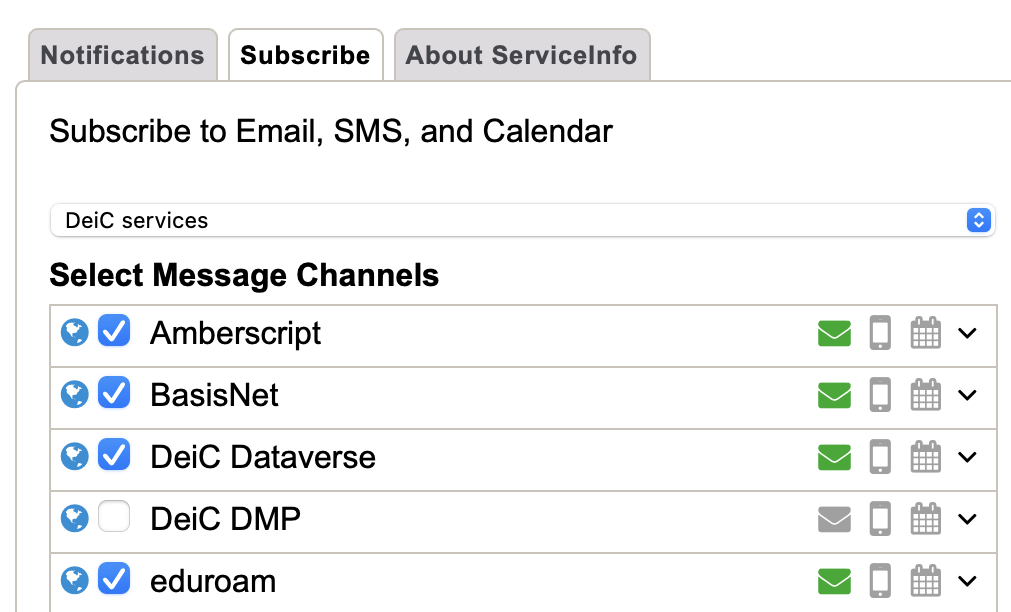What is ServiceInfo?
ServiceInfo is a solution where system administrators at institutions can send messages about operational events and other service-related information to their users.
The messages are sent to users who have subscribed to specific message channels and can be received via email, SMS, and calendar notifications, displayed in the user's calendar.
The messages are displayed on serviceinfo.dk, and institutions can also choose to use ServiceInfo's API, allowing them to display messages in their own format on their own website.
When is ServiceInfo used?

ServiceInfo is typically used by system administrators to send status messages for a service. A message channel is created for the service, where the system administrator can send information to users. The information may include:
Planned operations: For example, a notification about the expected time and duration of downtime or reduced functionality due to planned service.
Out of Order: An urgent notification about a service event affecting the service.
Solved Problems: A notification about a previously resolved service event.
General information: For example, suggestions for optimal use of the service, new functionality, or invitations to webinars and events, with an accompanying calendar invitation that can be added to the calendar at the right time.
Who can use ServiceInfo?
All users of DeiC’s services can use ServiceInfo. In the example to the right, a list of available services from DeiC is shown, where an end user has configured their subscription.
Institutions connected to the Research Network can have their own instance, i.e., their own list of message channels and their own administrative access to ServiceInfo. Here, multiple “editors” can be granted access to send messages for the institution’s channels, and several local administrators can manage requests and rights, etc., for the institution’s users.
Before an “editor” can create, send, and manage messages, the editor sends a request to ServiceInfo's local administrators, who can then process the request in the ServiceInfo administrative interface.
If the institution uses ServiceInfo's API, messages can be displayed in their own format on their own website. This also allows them to provide access to messages via their own web pages.
What is required to use ServiceInfo?
It is easy to use ServiceInfo. It only requires an internet connection and that your institution uses Where Are You From (WAYF) (see www.wayf.dk). If you cannot use WAYF, you can create a so-called DeiC login with a regular username and password.
What about legal matters, security, and personal data?
Access Control: Access is granted via the user’s username and password from their home organisation (via WAYF), or via a DeiC login – a self-created account that requires approval from the local administrator. This applies to both end users and administrators, with the latter needing to create a DeiC login, which can be used in case of failure in local systems.
Data Storage: ServiceInfo and its associated data are hosted in DeiC’s data center at DTU in Lyngby, with redundancy and failover at a data center in Skanderborg.
Logging: Access to the service is logged via WAYF (read more at www.wayf.dk) and by ServiceInfo. Access logs are deleted periodically. Sent messages are stored in the solution itself and are subsequently available to the editors of the channel and local administrators of the ServiceInfo instance. Sent messages are stored locally in the users’ email solution and SMS solution.
Encryption: Communication between the user and the service is done via an encrypted connection (https).
Backup: Regular backups of the solution and data are made.
Data Processor Agreement: No data processor agreement is offered for the service, as the service does not process personal data for users. A data processor agreement is offered for WAYF.
Terms: The service is covered by the Research Network Service Level Agreement.
What does it cost to use ServiceInfo?
The use of ServiceInfo is free for users and administrators if the institution is connected to the Research Network or WAYF. This also applies if an institution wants to use its own instance of ServiceInfo as an operational status service for its own institution.
Where can I get support?
System support: If you want to contact ServiceInfo support, please email us at support@serviceinfo.dk.
Service status for ServiceInfo: Representatives and dedicated users are encouraged to subscribe to operational and service messages at https://serviceinfo.dk.
Service Manager: Thorkild Jensen is the service manager and can be contacted at support@serviceinfo.dk.




